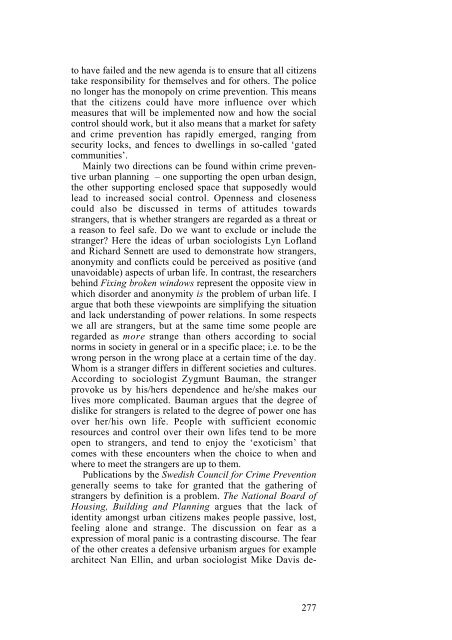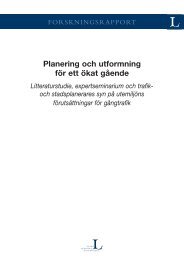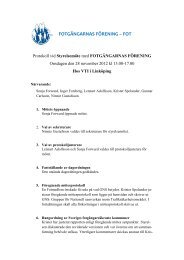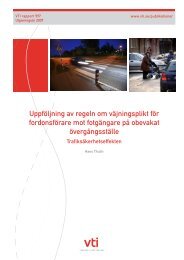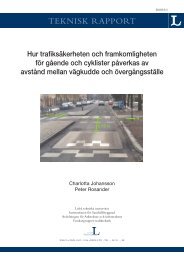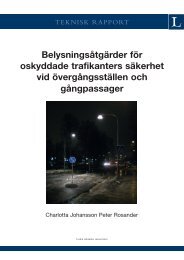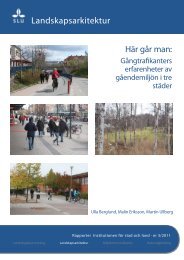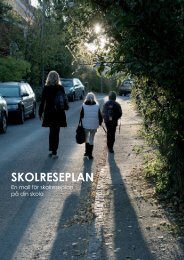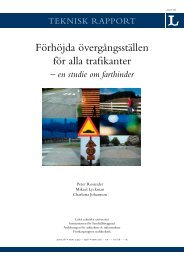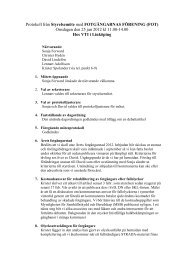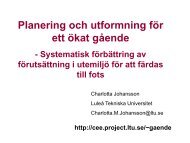- Page 11:
KAPITEL 1InledningMany women and mu
- Page 16 and 17:
kunna undvika just den kontroll och
- Page 18:
K a m p e n o m d e t o f f e n t l
- Page 21 and 22:
KAPITEL 2Teoretiska utgångspunkter
- Page 23 and 24:
utgångspunkter är stor. Inom rame
- Page 25 and 26:
stadsmiljöer har också inneburit
- Page 27 and 28:
P r i v a t o c h o f f e n t l i g
- Page 29 and 30:
konsekvenser för människors varda
- Page 31 and 32:
ungdomar. De grupperna utgör ofta
- Page 33 and 34:
Kvinnorörelsens intresse för bost
- Page 35 and 36:
samma ”organisatoriska stötesten
- Page 37 and 38:
detta sätt bland de svenska kommun
- Page 39 and 40:
skaper om könsrelationer behöver
- Page 41 and 42:
Den situationella preventionen ser
- Page 43 and 44:
kvinnor. Kvinnorna hamnade inte i s
- Page 45 and 46:
det ”reella” är att tankarna m
- Page 47 and 48:
som syftar till att öka jämställ
- Page 49 and 50:
ativism innebär att man måste se
- Page 51 and 52:
som skapat en motdiskurs till kontr
- Page 53 and 54:
spets, räcka om man lät de andra
- Page 55 and 56:
vidare. I militärläger utvecklade
- Page 57 and 58:
fram under senare år. Istället f
- Page 59 and 60:
När man vänder sig till översikt
- Page 61 and 62:
uppnå kontroll över det studerade
- Page 63 and 64:
alliserats i ett senare skede av av
- Page 65 and 66:
Med snäva begrepp låses positione
- Page 67 and 68:
Inom stadsplanering är trygghetsbe
- Page 69 and 70:
”varför” och när man som fors
- Page 71 and 72:
utgångspunkten att de i någon for
- Page 73 and 74:
Varför valde jag då att samla ytt
- Page 75 and 76:
vjuare vara medveten om sin egen ro
- Page 77 and 78:
soner från stadsdelsförvaltningen
- Page 79:
D E L I IT R Y G G H E T S -D I S K
- Page 82 and 83:
förståelser av rum än just den s
- Page 84 and 85:
utsätter att kriminellt beteende
- Page 86 and 87:
arbeten inte något större utrymme
- Page 88 and 89:
den tredje traditionen utgår persp
- Page 90 and 91:
Sociologen Kate Painter argumentera
- Page 92 and 93:
1975 (Sv. Våldtäkt 1977), som kom
- Page 94 and 95:
E n d i s k u r s a n a l y t i s k
- Page 96 and 97:
majority have learnt to manage viol
- Page 98 and 99:
I n t e b a r a k ö nTrots att kri
- Page 100 and 101:
N y a i n r i k t n i n g a rForskn
- Page 102 and 103:
kvinnor rädda och inte den fysiska
- Page 104 and 105:
En annan fråga jag vill lyfta fram
- Page 106 and 107:
I den rationella praktik som stadsp
- Page 109 and 110:
KAPITEL 4Att bygga den tryggaoch s
- Page 111 and 112:
ska komma att utarmas ekonomiskt, s
- Page 113 and 114:
igt rum, som beskriver graden av an
- Page 115 and 116:
mellan dem som förnekar den fysisk
- Page 117 and 118:
emot Newman att det är genom en ö
- Page 119 and 120:
anglosaxiska inflytandet är stort
- Page 121 and 122:
inuerligt av de som rör sig där.
- Page 123 and 124:
det också är en snabbt växande s
- Page 125 and 126:
situationella skolan har en mer nya
- Page 127 and 128:
Clarke rekommenderar därför myndi
- Page 129 and 130:
marknadsförts som en vara bland an
- Page 131 and 132:
Toronto i samband med en mer nylibe
- Page 133 and 134:
av metaforer och dystopiska visione
- Page 135 and 136:
fler motiverade gärningsmän och f
- Page 137 and 138:
with the degree of personal insulat
- Page 139 and 140:
mot stadssaneringen och uteslutning
- Page 141 and 142:
ade att i de brottsförebyggande pr
- Page 143 and 144:
trycka på ifall man upplever en ho
- Page 145 and 146:
Force on Community Safety för att
- Page 147 and 148:
are miljöer. 71 Dortmund är ett e
- Page 149 and 150:
exemplena, vilket också gav Toront
- Page 151 and 152:
till exempel innebär arbetslöshet
- Page 153:
145
- Page 156 and 157:
Lokala brottsförebyggande råd i S
- Page 158 and 159:
åtgärder skall bestämmas utifrå
- Page 160 and 161:
ering av olika förebyggande arbete
- Page 162 and 163:
G e n o m f ö r a n d e o c h u t
- Page 164 and 165:
ar att det kan vara svårt för lok
- Page 166 and 167:
F o r m a l i s e r i n g e n a v t
- Page 168 and 169:
”ge tjuven tillfället” i enlig
- Page 170 and 171:
Skandia, Göteborgs Posten och Göt
- Page 172 and 173:
förbund, Stadsmissionen, Quadricep
- Page 174 and 175:
ett aktivt medborgarinflytande samt
- Page 176 and 177:
det kan handla om astma och allergi
- Page 178 and 179:
ska kunna berätta något om stadsd
- Page 180 and 181:
samman busshållplatsen med spårva
- Page 182 and 183:
torget har inte kännbart livats up
- Page 184 and 185:
parkeringsgaragen som problem. Svar
- Page 186 and 187:
man att kontakten med kunderna är
- Page 188 and 189:
genom ett välfärdsbyggande. Missn
- Page 190 and 191:
händer det saker i Bergsjön, men
- Page 192 and 193:
samma människor från olika organi
- Page 194 and 195:
och skola och 4) trygghet och trivs
- Page 196 and 197:
stadsdelsförvaltningen ser man til
- Page 198 and 199:
Stadsdelen görs sårbar genom vad
- Page 200 and 201:
land annat frågor ställdes om upp
- Page 202 and 203:
(precis som i Tynneredsexemplet). E
- Page 204 and 205:
isterna som i hög fart utövade te
- Page 206 and 207:
…vi hittade en form där en perso
- Page 208 and 209:
ett könsperspektiv och att kvinnor
- Page 210 and 211:
KARTA ÖVERGÖTEBORGBERGSJÖNTYNNER
- Page 212 and 213:
BILD III & IV: Spårvagnshållplats
- Page 214 and 215:
BIILD VII & VIII: Spårvagnshållpl
- Page 216 and 217:
BILD XI: Graffiti centrala Götebor
- Page 219 and 220:
KAPITEL 6Mötet mellan forskning,po
- Page 221 and 222:
känsla av otrygghet genom att för
- Page 223 and 224:
ska fungera när du kör härifrån
- Page 225 and 226:
ningen inte riktigt stämmer övere
- Page 227 and 228:
men sen när man börjar peta lite
- Page 229 and 230:
kvinnor är mer fotgängare och är
- Page 231 and 232:
iakttagelserna. Kvinnors rädsla fr
- Page 233 and 234:
Offentligt rum - om trygghet och de
- Page 235 and 236:
iktlinjer och forskning inget stöd
- Page 237 and 238:
Orsaken till otrygghet anses handla
- Page 239 and 240: man gjorde om entréerna - men det
- Page 241 and 242: Polisen är väl medveten om detta
- Page 243 and 244: Statistiska kurvor som går upp ell
- Page 245 and 246: och att utveckla dess profil som ev
- Page 247 and 248: men arbetar man lokalt med närmilj
- Page 249 and 250: urser utan att egentligen mer resur
- Page 251 and 252: ionaliserats i egen form, men det h
- Page 253 and 254: om de har egna specifika begreppsap
- Page 255 and 256: Utredningen representerar en brytpu
- Page 257 and 258: KAPITEL 7Avslutande diskussion- en
- Page 259 and 260: sla för att röra sig i staden. Fo
- Page 261 and 262: heten går att bygga bort. Men avsa
- Page 263 and 264: Skapandet av främlingarEtt återko
- Page 265 and 266: ingarna jag funnit inneburit slyrö
- Page 267 and 268: normala brottsligheten och otrygghe
- Page 269 and 270: heter och behov i vardagslivet. I k
- Page 271 and 272: kroppen (med alla dess yttre attrib
- Page 273 and 274: statliga myndigheter idag istället
- Page 275 and 276: alla, generellt, men de bortser ifr
- Page 277: personer eller grupper av individer
- Page 280 and 281: for the progression of women's equa
- Page 282 and 283: important person in the society. Th
- Page 284 and 285: norms in society. A discourse analy
- Page 286 and 287: the victims of crime than men; 2) w
- Page 288 and 289: excluded from safety work? Some gro
- Page 292 and 293: scribes the scene of growing fortre
- Page 294 and 295: suburbs, but they share a break wit
- Page 296 and 297: health and the environment, which a
- Page 298 and 299: 284
- Page 300 and 301: Bild I & II:Opaltorget, TynneredEft
- Page 302 and 303: BILD V: Galileis gata, BergsjönBIL
- Page 304 and 305: BILD IX & X: Spårvagnshållplats R


